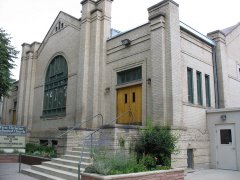On Sunday morning, I quoted Sietze Buning's (Stanley Weirsma's) poem Obedience. However, I left out what I think may be the best part (the last few paragraphs). So for your pleasure (and pondering), here it is in full:
Were my parents right or wrong
not to mow the ripe oats that Sunday morning
with the rainstorm threatening?
I reminded them that the Sabbath was made for man
and of the ox fallen into the pit.
Without an oats crop, I argued,
the cattle would need to survive on town-bought oats
and then it wouldn't pay to keep them.
Isn't selling cattle at a loss like an ox in a pit?
My parents did not argue.
We went to church.
We sang the usual psalms louder than usual--
we, and the others whose harvests were at stake:
"Jerusalem, where blessing waits,
Our feet are standing in thy gates."
"God be merciful to me;
On thy grace I rest my plea."
Dominie's spur-of-the-moment concession:
"He rides on the clouds, the wings of the storm;
The lightning and wind his missions perform."
Dominie made no concessions on sermon length:
"Five Good Reasons for Infant Baptism,"
Though we heard little of it,
for more floods came and more winds blew and beat
upon that House than we had figured on, even,
more lighting and thunder
and hail the size of pullet eggs.
Falling branches snapped the electric wires.
We sang the closing psalm without the organ and in the dark:
"Ye seed from Abraham descended,
God's covenant love is never ended."
Afterward we rode by our oats field,
flattened.
"We still will mow it," Dad said.
"Ten bushels to the acre, maybe, what would have been fifty
if I had mowed right after milking
and if the whole family had shocked.
We could have had it weatherproof before the storm."
Later at dinner Dad said,
"God was testing us. I'm glad we went."
"Those psalms never gave me such a lift as this morning,"
Mother said, "I wouldn't have missed it."
And even I thought but did not say,
How guilty we would feel now if we had saved the harvest.
The one time Dad asked me why I live in a Black neighborhood,
I reminded him of that Sunday morning.
Immediately he understood."
Sometime around the turn of the century
my sons may well bring me an article in The Banner
written by a sociologist who argues,
"The integrated neighborhoods of thirty years ago,
in spite of good intentions,
impaired Black self-image and delayed Black independence."
Then I shall tell my sons about that Sunday morning.
And I shall ask my sons to forgive me
(who knows exactly what for?)
as they must ask their sons to forgive them
(who knows exactly what for?)
as I have long ago forgiven my father
(who knows exactly what for?)
Fathers often fail to pass on to sons
their harvest customs
for harvesting grain or real estate or anything.
No matter, so long as fathers pass on to sons
another more important pattern
defined as absolutely as muddlers like us can manage:
obedience.
Seitze Buning, in Purpaleanie and other Permutations
The Middleburg Press, Orange City, IA. 1978.
Subscribe to:
Post Comments (Atom)

No comments:
Post a Comment